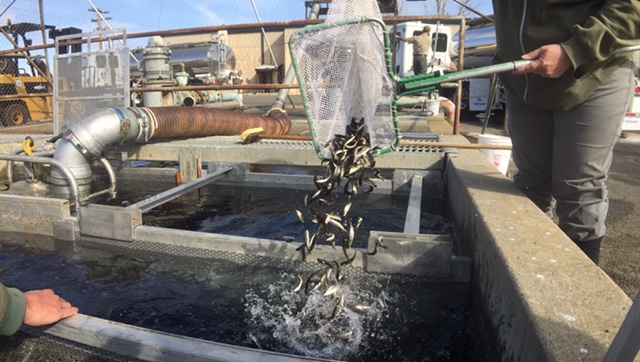Fish Report for 3-21-2017
Coyote death linked to rodenticides
by CDFW
3-21-2017
Website
The carcass of a young and otherwise healthy coyote found in a San Francisco park has tested positive for four different types of rat poison – all of which are illegal for non-professional use in California.
The body of the female coyote was found in Douglass Park in February. Lab test results, recently received by WildCare, prove that the coyote’s death was caused by the consumption of rats that had in turn been poisoned by rodenticide.
Most urban coyote deaths are caused by cars, but radiographs (x-rays) and a postmortem exam at WildCare showed that this coyote had no external injuries.
“If an animal the size of a coyote can ingest enough poisoned rats to kill her, there is no arguing about the prevalence of rodenticides in our environment, and the extreme danger of using these poisons,” said Kelle Kacmarcik, Director of Advocacy at WildCare.
Regulations enacted in 2014 restrict the usage of the most toxic anticoagulant rodenticides to only licensed pest control operators. Homeowners and residents facing pest problems should properly dispose of any previously purchased pesticides containing the active ingredients brodifacoum, bromadiolone, difethialone or difenacoum. A list of statewide facilities that are authorized to dispose of household hazardous waste can be found here.
In addition to the state regulations, the city of San Francisco maintains a strong anti-rodenticide stance. City and county entities are required to use less toxic alternatives to manage rodents and only use poison as a last result. Rodenticides are not used in city parks, including Glen Canyon, Douglass and Christopher parks.
The coyote’s necropsy report showed the cause of death to be massive internal bleeding due to rat poisoning. Four different types of rat poisons were detected in her liver. Since each brand of commercially available rat poison only carries one of the available rodenticide compounds, the coyote must have eaten rats poisoned from at least four different sources.
It is impossible to determine the exact sources of the poisons. This otherwise healthy coyote died as a result either of residents and local businesses hiring pest control operators or illegal use of rodenticides by consumers.
“These poisons are everywhere, and ironically, they are killing the very animals nature provides to control rodent populations,” Kacmarcik said.
WildCare has been actively testing rodent predators since 2006. Over the last 11 years, 76 percent of predatory animals tested have been found to carry one or more rat poisons in their blood.
For more information about alternative methods of controlling pests, please see wildlife.ca.gov/Living-with-Wildlife/Rodenticides and wildcarebayarea.org/rodenticide.
< Previous Report Next Report >
< Previous Report Next Report >
More Reports

3-20-2017
The California Department of Fish and Wildlife (CDFW) in cooperation with the National Oceanic and Atmospheric Administration (NOAA) National Marine...... Read More

3-16-2017
Question: Can I pick up and remove a crab pot that is a navigational hazard and/or has significant line floating on...... Read More

Website Hosting and Design provided by TECK.net